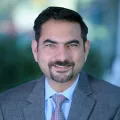ResearCHLA Media Day 2023
Future-Proofing Children’s Health: Reducing the Impacts of Obesity and Diabetes
Chronic diseases like diabetes, obesity, heart disease and others have their origins in childhood. These conditions are responsible for a negative impact on quality of life as well as a shortened lifespan. The economic costs are also devastating—90% of annual health care spending in the U.S. goes toward the treatment of chronic disease. Health care disparities shift this burden of chronic disease to communities also impacted by social, economic, and environmental factors.
At Children’s Hospital Los Angeles, we are working to change this trajectory with innovative research and leading-edge clinical care. Our investigators will explain how they are using their expertise to advance knowledge and develop solutions to address this national crisis.
June 13, 2023, 10-11 a.m. PST/1-2 p.m. EST
RSVP
To attend virtually or in-person, RSVP to: Media@chla.usc.edu
*There are two RSVP options: 1) In-Person, and 2) Virtual (Livestream). When you RSVP, you will receive more event information with links or directions and parking details.
Panel moderated by:

Pat Levitt, PhD
Chief Scientific Officer and Director, The Saban Research Institute
Dr. Levitt is a developmental neuroscientist pursuing basic research studies of emotional and cognitive development, the influence of genetic diversity, and the impact of early adversity on metabolic and behavioral functions across the lifespan. His lab’s human research studies examine the brain, behavioral and psychophysiological development of infants who are at risk for experiencing toxic stress due to early adversity. He is an elected member of the National Academy of Medicine and sits on the governing board of the California Institute for Regenerative Medicine.
Panelists:

Rohit Kohli, MBBS, MS
Chief, Division of Gastroenterology, Hepatology and Nutrition
Obesity-related fatty liver disease is linked to both genetics and diets high in fat and sugar. In the U.S., 1 in 4 people have fatty liver disease. The rate is higher in the Latino community—some studies report as high as 45%. Dr. Kohli has called it a “silent tsunami” affecting Latino children. In its most severe form, fatty liver disease can result in the need for a liver transplant. It is the fastest growing reason for liver transplantation in young adults. Dr. Kohli’s research focuses on potential interventions for fatty liver disease including the metabolic effects of bariatric surgery.

Alaina Vidmar, MD
Medical Director, Healthy Weight Clinic
Pediatric obesity is a chronic disease. If left untreated, it becomes adult obesity and ultimately can cause a shortened lifespan for the individual. Dr. Vidmar stresses that obesity is a disease process and not the fault of the patient. This disease can be treated effectively with medication and/or surgery similar to other diseases. Anti-obesity medications (like semiglutide) are tools used to correct or improve changes in biology that cause obesity. These changes are neurologic and metabolic and are different compared to non-obese people. Dr. Vidmar uses a variety of tools to help children and adolescents achieve a healthier outcome that is not dependent on a certain weight or size.

Senta Georgia, PhD
Principal Investigator, Endocrinology, Diabetes and Metabolism
Dr. Georgia approaches diabetes and obesity from a basic science perspective. Her work includes regenerating insulin-producing pancreatic cells for treatment of diabetes, and how COVID-19 has affected insulin-producing cells to cause an increase in the amount and severity of diabetes in youth since the start of the pandemic.

Michael I Goran, PhD
Program Director for Diabetes and Obesity at The Saban Research Institute
Dr. Goran studies how the body regulates where excess fat is stored, how increased body fat affects health and how it changes during growth and development across different segments of the population. He is director of the Southern California Center for Latino Health, an NIH-funded consortium focused on the social determinants of health and chronic health disparities including obesity, diabetes, fatty liver disease and increased levels of fat in the blood stream.
